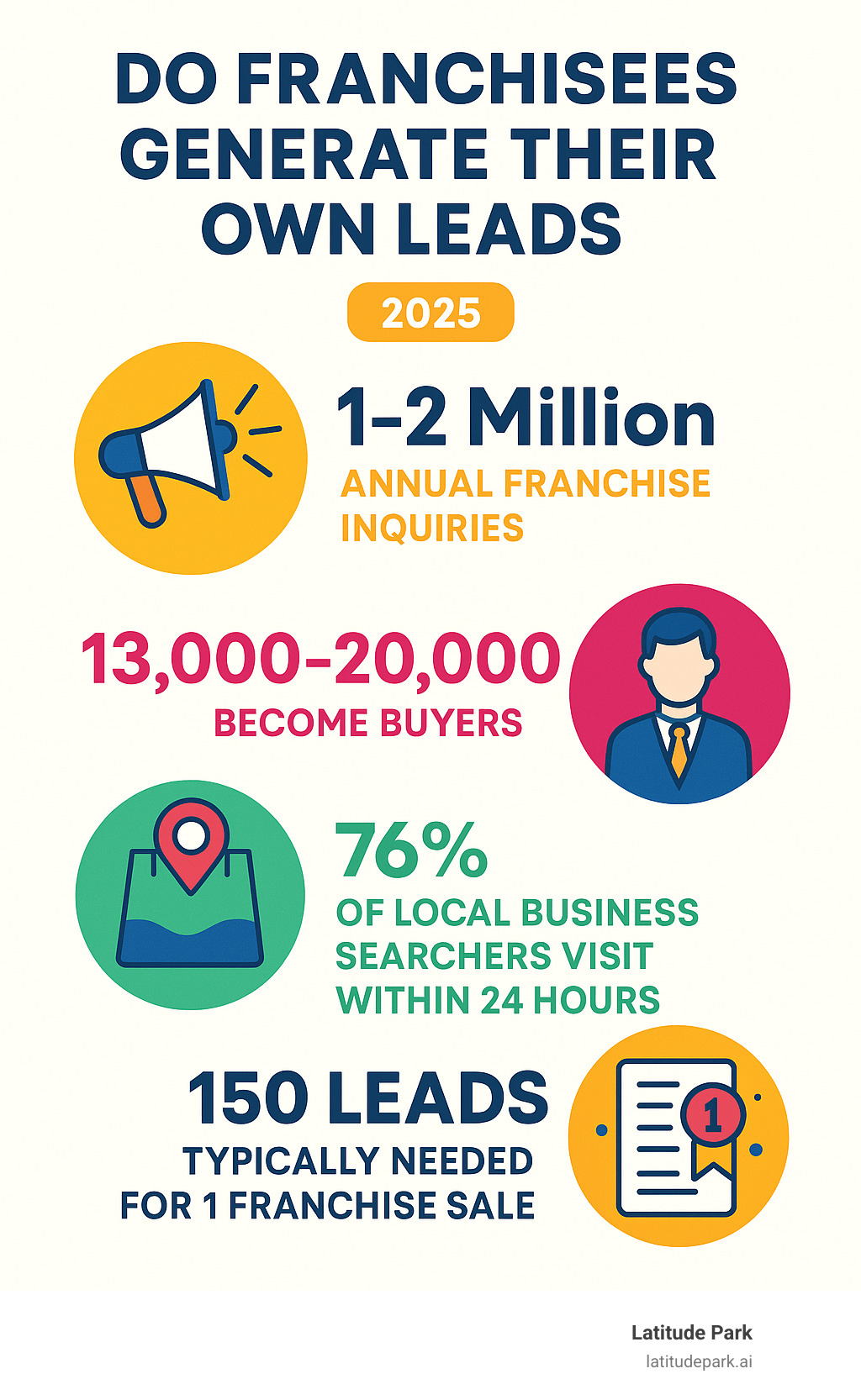The Great Lead Generation Divide: Who Does What?
It’s Not a War, It’s a Partnership
Picture this: You’re at a franchise conference, and someone asks the age-old question—“Do franchisees generate their own leads?” The room splits into two camps. Half the franchisors start nodding vigorously while franchisees shift uncomfortably in their seats. The other half looks genuinely confused.
Here’s the thing—franchise lead generation isn’t a battle between franchisor and franchisee. It’s more like a well-choreographed dance where both partners have distinct moves that create something beautiful together.
Franchising itself is built on collaboration; the International Franchise Association estimates that more than 8.7 million U.S. workers rely on the teamwork between franchisors and their local operators. The franchise industry has moved way beyond the old-school “corporate sends you customers” model. Today’s successful franchise systems thrive on shared responsibility where everyone knows their role and plays it well.
Common misconceptions still trip people up, though. We’ve met countless prospective franchisees who think they’ll get a magic pipeline of customers from headquarters. On the flip side, some franchisors assume their franchisees can handle all local marketing without proper support or training.
The reality is much more nuanced. Franchisors focus on franchise development leads—attracting investors, building brand recognition, and creating the systems that make everything possible. Meanwhile, franchisees concentrate on customer leads—the local folks who actually buy products and services.
Think of it this way: when Jim’s Mowing corporate builds brand awareness through national campaigns, they’re setting the stage. But when a local franchisee drives that branded trailer through a neighborhood, they’re the ones converting that awareness into actual lawn care appointments.
This partnership approach works because it plays to each party’s strengths. Franchisors understand big-picture marketing, brand consistency, and scalable systems. Franchisees know their communities, local preferences, and how to build lasting customer relationships.
The magic happens when these two worlds work together instead of against each other. That’s when franchise systems really take off and both parties win.
The Franchisor’s Battlefield: Attracting New Franchisees
When franchisors think about lead generation, they’re hunting for an entirely different type of prospect than their franchisees. While franchisees focus on do franchisees generate their own leads for local customers, franchisors are targeting potential investors with serious capital – people who want to own a business, not just buy a product.
At Latitude Park, we help franchisors steer this complex landscape through strategic Paid Ads for Franchise Sales. Our Meta advertising campaigns zero in on high-net-worth individuals who match the ideal franchisee profile, using sophisticated audience targeting that goes way beyond basic demographics.
National brand building forms the backbone of every successful franchisor’s lead generation strategy. This isn’t just about pretty logos and catchy slogans – it’s about establishing the credibility and recognition that potential franchisees need to see before they’ll consider investing their life savings.
Think about it from an investor’s perspective. When someone’s researching franchise opportunities, they’re not just looking for a business model. They’re looking for a proven system with solid corporate marketing, established brand recognition, and the kind of professional presence that gives them confidence in their investment.
LinkedIn marketing has become a goldmine for franchise recruitment, delivering conversion rates of 3-5% with audiences that have twice the buying power of average users. We’ve finded that LinkedIn’s advanced targeting capabilities let franchisors reach decision-makers who are actively considering business ownership opportunities, not just casually browsing.
The numbers tell a compelling story about how different franchise development leads behave compared to regular customers. Potential franchisees consume an average of 3 hours of content early in their research process, compared to just 20 minutes for typical consumers. They visit franchise opportunity websites an average of 16 times versus 3.5 visits for regular leads.
Content marketing becomes crucial when you understand this behavior. These prospects are doing serious homework, diving deep into financial performance data, territory maps, and operational requirements. They’re not impulse buyers – they’re making calculated investment decisions.
Findy Days represent the ultimate conversion opportunity in franchise sales. These events, whether virtual or in-person, allow potential franchisees to experience the brand culture and meet existing operators. Interactive elements like virtual tours and live Q&A sessions significantly improve conversion rates because they create the personal connection that digital marketing alone can’t provide.
Public relations and trade shows still play important roles in franchise development, offering face-to-face networking opportunities that digital channels can’t replicate. However, the most successful franchisors combine these traditional approaches with modern digital strategies rather than relying on one or the other.
SEO helps franchisors capture prospects who are actively searching for franchise opportunities in their industry. When someone searches for “restaurant franchise opportunities” or “home service franchises,” having strong organic visibility can capture high-intent leads at the perfect moment in their research process.
What types of leads do franchisors generate?
Franchise candidates represent the sweet spot – individuals actively researching franchise opportunities with the financial capacity to actually invest. These leads typically have liquid capital of $100,000 or more and are seriously considering business ownership, not just daydreaming about it.
Investors include those looking for passive income opportunities or portfolio diversification. They may be interested in multi-unit development or master franchise agreements rather than rolling up their sleeves for hands-on operation. These leads often have larger investment capacity but may require different messaging and support.
Multi-unit operators are experienced franchisees looking to expand their portfolio. These leads often convert faster because they already understand the franchise model and have proven operational capabilities. They’re not starting from scratch – they’re scaling what they know works.
Business opportunity seekers represent a broader category of people exploring alternatives to traditional employment. While this group generates higher lead volume, conversion rates tend to be lower due to varying levels of commitment and financial qualification. They’re often in the early exploration phase.
The challenge with franchise development leads is the sheer volume needed to generate actual sales. Lead qualification becomes critical because franchisors typically need 150 leads to generate one sale. This means effective screening and nurturing processes can dramatically improve ROI on marketing spend.
How do franchisors qualify potential new franchisees?
The qualification process starts with financial requirements. Most franchisors establish minimum liquid capital and net worth thresholds based on their investment levels and working capital needs. This initial screening helps focus resources on viable candidates rather than wasting time on unqualified prospects.
The Franchise Disclosure Document (FDD) serves as both an information tool and qualification checkpoint. Serious candidates will review the FDD thoroughly and ask informed questions about financial performance, territory rights, and operational requirements. Prospects who won’t engage with the FDD usually aren’t serious buyers.
The Findy Day process provides mutual evaluation opportunities. Potential franchisees can assess the corporate culture and support systems, while franchisors evaluate candidates’ fit with their brand values and operational philosophy. It’s like a job interview that goes both ways.
Lead nurturing becomes essential given the 5-month average timeframe from initial inquiry to signed agreement. Effective Lead Nurturing Best Practices for Long-Term Success include automated email sequences, personalized follow-up, and educational content that addresses common concerns and objections.
The key is understanding that franchise development leads need more time, more information, and more personal attention than typical consumer leads. They’re making life-changing decisions, not purchasing decisions, and the sales process needs to reflect that reality.
The Franchisee’s Frontline: Winning Local Customers
While franchisors chase potential investors with sophisticated campaigns, franchisees are out in their communities doing the real work of building customer relationships. This is where the rubber meets the road – where brand promises turn into actual revenue.
Do franchisees generate their own leads? You bet they do. And honestly, they’re often better at it than corporate headquarters could ever be. They know Mrs. Johnson prefers service calls on Tuesday mornings. They understand that the local business district gets busy during lunch hours. They’ve figured out which neighborhoods respond best to door hangers and which ones prefer digital outreach.
Local marketing becomes an art form when you’re working at the community level. It’s not about massive ad spends or fancy targeting algorithms. It’s about showing up consistently, building trust one conversation at a time, and becoming the go-to solution when people need what you offer.
The power of community engagement can’t be overstated. When a franchisee sponsors the local Little League team or sets up a booth at the farmers market, they’re not just advertising – they’re becoming part of the community fabric. People buy from businesses they know and trust, especially for services that involve coming to their home or handling their personal needs.
Take that image of the branded service vehicle above. That’s not just transportation – that’s a mobile marketing machine. Jim’s Mowing proved this concept works brilliantly, with their 120-130 branded trailers generating 20-40% of leads in certain markets. Every time that truck rolls through a neighborhood, it’s building brand awareness and credibility.
But modern franchisees can’t rely on branded vehicles alone. They need to master Local SEO: Optimizing Website for Local Search Results to capture the growing number of customers who search for services online. When someone types “plumber near me” or “house cleaning service,” franchisees need to appear in those results.
Google Business Profile optimization has become absolutely critical for local success. A well-maintained profile with current photos, accurate hours, and positive reviews can make the difference between getting the call or losing it to a competitor. It’s one of those tasks that takes minimal effort but delivers maximum impact.
Customer reviews create a beautiful cycle of lead generation. Happy customers leave positive reviews, which attract new customers, who hopefully become happy customers themselves. It’s simple but incredibly effective. The research shows that 76% of users who search for a local business on mobile visit a store within 24 hours – making that online reputation absolutely crucial.
Word-of-mouth marketing remains the gold standard for local businesses. When your neighbor recommends a service, that carries more weight than any advertisement ever could. Smart franchisees focus heavily on customer satisfaction because they know one happy customer can generate multiple referrals.
How do franchisees generate their own leads locally?
The beauty of local lead generation lies in its variety and creativity. Franchisees have dozens of tactics at their disposal, each perfectly suited to their specific market and customer base.
Local events provide unbeatable face-to-face opportunities. Whether it’s a home and garden show, community festival, or chamber of commerce mixer, these events let franchisees demonstrate their expertise and personality. You can’t get that human connection through a Facebook ad.
Those branded vehicles we mentioned earlier deserve special attention. They’re working 24/7, creating brand awareness every time they’re parked at a job site or driving through target neighborhoods. It’s like having a billboard that actually does useful work.
Door hangers might seem old-school, but they work beautifully for service businesses. They’re targeted, affordable, and put your message directly in the hands of potential customers. Plus, they’re hard to ignore – unlike digital ads that can be scrolled past in seconds.
Google Business Profile Optimization ensures franchisees show up when locals search for services. This includes keeping business information current, posting regular updates, and actively managing customer reviews.
Online reviews deserve constant attention because they influence purchasing decisions more than almost any other factor. Smart franchisees make review generation and management a core part of their customer service process.
Repeat business and referrals represent the highest-quality leads because they come with built-in trust. Franchisees who focus on customer satisfaction create sustainable lead generation that compounds over time.
What types of leads do franchisees generate?
Franchisee lead generation focuses on real customers with real needs – the people who actually pay the bills and keep the business running.
End customers are the bread and butter of any franchise operation. These are homeowners who need lawn care, families wanting pizza delivery, or business owners requiring cleaning services. They convert into immediate revenue and, hopefully, long-term relationships.
Local clients include both residential and commercial customers within the franchisee’s territory. Understanding this mix helps franchisees allocate their marketing efforts effectively. A commercial cleaning franchise might focus heavily on office buildings, while a residential service concentrates on neighborhood marketing.
Service inquiries come from customers with immediate needs. These high-intent leads often convert quickly but require prompt response and professional follow-up. Miss the call, lose the sale – it’s that simple in the service business.
Foot traffic matters for retail franchises where location and visibility drive walk-in customers. These leads require different strategies than service-based businesses, focusing more on storefront appeal and local advertising.
Online orders represent the growing digital component of many franchise systems. Even traditional service businesses now need systems to capture and fulfill requests that come through websites, apps, and social media platforms.
The key insight here is that franchisee lead generation is local and relationship-driven. While franchisors can build brand recognition and provide marketing tools, only franchisees can create the personal connections that turn prospects into loyal customers.
So, Do Franchisees Generate Their Own Leads? The Collaborative Answer
The question “do franchisees generate their own leads” deserves a nuanced answer that reflects how modern franchise systems actually work. The simple answer is yes – franchisees absolutely generate their own leads, but they don’t do it alone.
Think of it like a well-coordinated sports team. The franchisor acts as the coach, providing strategy, training, and resources. The franchisee is the player on the field, executing plays and adapting to local conditions. Both roles are essential, and success depends on how well they work together.
Franchisees handle the local customer acquisition that drives daily revenue. They’re the ones shaking hands at community events, responding to Google reviews, and building relationships with neighbors who become loyal customers. This local expertise simply can’t be replicated from corporate headquarters.
Meanwhile, franchisors focus on brand building and franchise development. They create the marketing systems, maintain brand consistency, and attract new investors to grow the overall network. These efforts create a foundation that makes local franchisee marketing far more effective.
The synergy between these roles creates something powerful. A franchisee with a recognizable brand and professional marketing materials can compete against much larger competitors. A franchisor with engaged local operators can build authentic community connections that national chains struggle to achieve.
At Latitude Park, we see this collaboration in action through our Digital Marketing Strategies for Franchises: Maximizing Online Success. The most successful campaigns combine corporate strategy with local execution, creating campaigns that feel both professional and personally relevant.
Brand consistency remains crucial throughout this partnership. Franchisees need enough creative freedom to address local market needs while maintaining the brand standards that customers recognize and trust. It’s a delicate balance that requires clear communication and well-defined guidelines.
The marketing fund contributions that franchisees make often support both national brand building and local marketing initiatives. This pooled approach allows individual franchisees to benefit from advertising scale and professional resources they couldn’t afford independently.
Why franchisees must generate their own leads with franchisor support
Local market knowledge gives franchisees advantages that no corporate marketing team can replicate. They know which neighborhoods prefer text messages versus phone calls, when seasonal demand peaks, and how local competitors price their services. This intimate understanding of market dynamics drives more effective campaigns.
Community relationships take years to build and require consistent local presence. When a franchisee sponsors the local little league team or volunteers at community events, they create trust and recognition that translates directly into customer loyalty. These relationships become a sustainable competitive advantage.
Agility in responding to local opportunities allows franchisees to capitalize on market conditions quickly. While corporate campaigns require planning cycles and approval processes, a local franchisee can adjust their Google ads or launch a neighborhood promotion within hours of identifying an opportunity.
National brand leverage provides instant credibility that independent businesses spend years trying to establish. When franchisees combine their local expertise with established brand equity, they create marketing advantages that neither could achieve alone.
The credibility that comes from brand association opens doors and reduces customer hesitation. People often prefer working with franchises because they perceive lower risk, more professional service, and greater accountability than independent operators can provide.
How franchisor support amplifies franchisee efforts
Marketing toolkits provide franchisees with professionally designed materials that maintain brand consistency while allowing local customization. These resources save significant time and money while ensuring quality standards that individual franchisees might struggle to achieve independently.
Ad templates for digital marketing campaigns allow franchisees to launch professional advertising quickly without starting from scratch. At Latitude Park, we create Scalable Social Media Strategy for Multi-Location Franchises that franchisees can implement locally with minimal customization.
CRM systems and lead management tools help franchisees track and nurture prospects more effectively than basic contact management allows. These systems often integrate with corporate reporting, providing valuable data for system-wide optimization and best practice sharing.
Training programs ensure franchisees understand both marketing fundamentals and brand-specific strategies. Ongoing education helps franchisees adapt to changing market conditions, new marketing technologies, and evolving customer expectations.
Brand guidelines provide clear parameters for local marketing initiatives without stifling creativity. These guidelines protect brand integrity while giving franchisees confidence to pursue local opportunities that align with overall brand strategy.
Overcoming Common Lead Generation Challenges
Even with clear role definitions and collaborative approaches, franchise systems face predictable challenges in lead generation. Understanding these challenges and implementing systematic solutions prevents minor issues from becoming major problems.
Budget constraints affect both franchisors and franchisees, but in different ways. Franchisors need sufficient marketing funds to build brand awareness and attract new investors, while franchisees need cost-effective local marketing tactics that generate immediate ROI.
ROI tracking becomes complex when multiple parties contribute to lead generation efforts. Determining whether a customer came from national brand awareness, local marketing, or a combination of factors requires sophisticated attribution models.
Brand dilution risks increase when franchisees have marketing freedom. Without proper guidelines and oversight, individual franchisees might inadvertently damage brand perception through poorly executed campaigns.
Lead quality varies significantly between different generation methods. While volume metrics might look impressive, conversion rates and customer lifetime value tell the real story about marketing effectiveness.
Inconsistent messaging across multiple locations can confuse customers and weaken brand positioning. Maintaining coherent communication while allowing local adaptation requires careful balance and clear guidelines.
We’ve helped numerous franchise systems overcome these challenges through our 9 Common Franchise Marketing Mistakes and How to Avoid Them approach, which addresses both strategic and tactical issues.
Challenge 1: Inconsistent Branding and Messaging
Brand inconsistency represents one of the most common and damaging franchise marketing problems. When individual franchisees create their own marketing materials or modify approved content inappropriately, they risk confusing customers and diluting brand equity.
The solution starts with centralized brand assets that provide franchisees with high-quality, pre-approved marketing materials. These assets should cover common local marketing needs while maintaining brand consistency.
Clear guidelines help franchisees understand what modifications are acceptable and which elements must remain unchanged. These guidelines should address logos, colors, fonts, messaging tone, and legal requirements.
Approval processes for custom marketing materials ensure brand compliance while allowing local adaptation. Modern technology makes it possible to streamline these processes without creating bottlenecks.
Understanding What is Franchise Marketing and Why is it Important? helps both franchisors and franchisees appreciate why brand consistency matters for long-term success.
Challenge 2: Limited Budgets and Resources
Budget constraints affect franchise marketing at every level, from individual franchisees struggling to afford local advertising to franchisors trying to build national brand awareness with limited resources.
Ad fund management provides one solution by pooling franchisee contributions to achieve advertising scale that individual operators couldn’t afford. These funds can support both national campaigns and local marketing initiatives.
Co-op advertising programs allow franchisees to access professional marketing services at reduced costs. By leveraging group buying power, franchise systems can provide high-quality marketing support more affordably.
Focusing on high-ROI local tactics helps franchisees maximize limited marketing budgets. Activities like Google Business Profile optimization and customer referral programs often generate better returns than expensive advertising campaigns.
Our Franchise Marketing Budget Tips help franchise systems allocate resources effectively while ensuring both corporate and local marketing needs are met.
Challenge 3: Poor Communication and Alignment
Communication breakdowns between franchisors and franchisees create numerous problems, from duplicated efforts to missed opportunities. When marketing and sales teams don’t coordinate effectively, lead generation suffers.
Regular meetings between corporate marketing teams and franchisee representatives ensure everyone understands current priorities and challenges. These meetings should include both strategic planning and tactical execution discussions.
Shared dashboards provide real-time visibility into lead generation performance across the franchise system. When everyone can see what’s working and what isn’t, collaboration improves naturally.
Integrated technology solutions eliminate data silos and improve communication flow. Modern franchise management systems can connect corporate marketing efforts with local execution seamlessly.
Feedback loops allow franchisees to share local market insights that inform corporate strategy. This bottom-up communication ensures marketing campaigns remain relevant and effective.

Conclusion: Winning the Lead Generation Game Together
So, do franchisees generate their own leads? The answer isn’t just yes or no – it’s about understanding that successful franchising works like a well-choreographed dance, where both partners know their steps and move in harmony.
Think of it this way: franchisees are the local heroes who build relationships at community events, optimize their Google Business Profile, and turn satisfied customers into raging fans. They’re the ones who understand that Mrs. Johnson prefers her lawn mowed on Wednesdays and that the local hardware store owner can refer three new customers a month.
But here’s the beautiful part – they’re not doing it alone. Franchisors provide the stage, the music, and the choreography. They create the brand recognition that opens doors, develop the marketing systems that save time and money, and offer the operational support that turns good intentions into great results.
Partnership beats competition every single time. When franchisors focus on building brand credibility and attracting new investors while franchisees concentrate on winning local customers, magic happens. Everyone plays to their strengths instead of stepping on each other’s toes.
At Latitude Park, we’ve watched this change happen countless times. Franchise systems that accept this collaborative approach see remarkable results. Their franchisees feel supported instead of abandoned, and their franchisors see stronger local performance that improves the entire brand.
The franchise world keeps changing – new technologies, shifting consumer behaviors, and evolving market conditions create constant challenges. But the systems that thrive are those that maintain clearly defined roles while staying flexible enough to adapt together.
Continuous improvement becomes the secret sauce. When franchisors listen to local market feedback and franchisees accept corporate marketing support, both parties grow stronger. It’s not about who’s right or wrong – it’s about what works for customers and builds long-term success.
The old tug-of-war mentality where franchisors and franchisees blame each other for lead generation problems? That’s yesterday’s thinking. Today’s winners understand that mutual success comes from mutual support, clear communication, and shared commitment to excellence.
Ready to transform your franchise lead generation from a source of frustration into a competitive advantage? Learn more about our Franchise Lead Generation Strategies and find how Latitude Park can help your franchise system achieve sustainable growth through effective digital marketing collaboration.
Because when franchisors and franchisees work together as true partners, everyone wins – including the customers who benefit from stronger brands and better local service.










